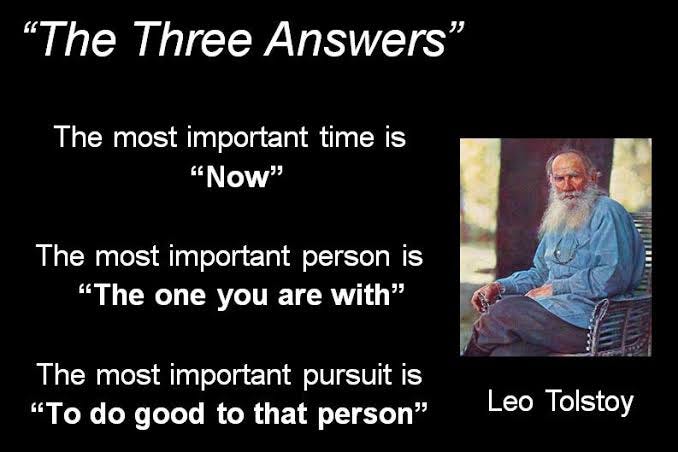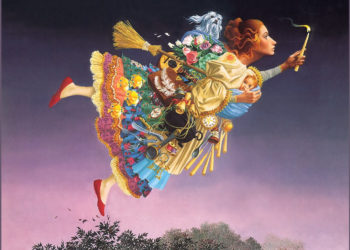It once occurred to a certain King that if he knew the right time to begin everything, the right people to listen to, and most importantly, the most important thing to do, he will never fail in anything he might undertake.
He threw these three questions open to his people and promised to handsomely reward whoever answered all three satisfactorily. Different learned men came to the King and answered the questions differently.
Some believed that to know the right time for every action, one must draw up in advance a table of days, months, and years and must live strictly by it.
Others declared it impossible to decide beforehand the right time for every action but that not letting oneself be absorbed by idle pastimes and always attending to what was most important was the right way to go.
Another group felt the King needed a council of wise men who would help him fix the right time for everything.
Yet another group felt some things were too urgent to be subject to a council’s deliberations and thus felt magicians were the right people to consult to know the right time for every action
Equally various were the answers to the second question. Some people felt the councilors were the most important. Others, the priests. Some, the doctors while others felt it was the warriors.
To the third question, some replied that the most important thing in the world was science, others, warfare, and others again said it was religious worship.
But the King agreed with none of the answers and thus rewarded no one. Still wishing for answers to his questions, he decided to consult a Hermit widely renowned for his wisdom.
The Hermit lived deep in the woods, never left his abode, and only attended to commonfolk. So the King put on common clothes and before reaching the Hermit’s abode, dismounted from his horse and leaving his bodyguard behind, went on alone. When the King approached the Hermit, he was digging the ground in front of his hut. The old man greeted the King and went on digging. The Hermit was frail and weak and each time he struck his spade into the ground and turned a little earth, he breathed heavily.
The King went up to him and asked him the three questions:
How can I learn to do the right thing at the right time?
Who are the people I need the most and who, therefore, should I pay the most attention to?
What affairs are most important and need my first attention?
The Hermit listened to the King but said nothing. He just spat on his hands and continued digging.
“You are tired,” said the King, “Let me take the spade and work awhile for you.”
“Thanks,” said the Hermit, and giving the spade to the King, he sat on the ground.

When he had dug two beds, the King stopped and repeated the questions. The Hermit again gave no answer but rose, stretched out his hand for the spade and said:
“Now rest awhile and let me work a bit.”
But the King did not give him the spade and continued to dig. Hours passed and finally, the sun began to sink behind the trees, and the King, at last, stuck the spade into the ground and said:
“I came to you, wise man, for an answer to my questions. If you can give me none, tell me so and I will return home.”
“Here comes someone running,” said the Hermit, “Let’s see who it is.”
The King turned around and saw a bearded man running out of the woods. The man held his hands pressed to his stomach and blood was flowing from under them. He collapsed at the King’s feet, moaning feebly. The King and the Hermit unfastened the man’s clothes. There was a large wound on his stomach.

The King washed it as best as he could and bandaged it with his handkerchief and with a towel the Hermit had. He repeated this process many times until the wound stopped bleeding. The man revived asked for something to drink and the King brought fresh water and gave it to him. The sun had set and the weather was cool. So with the Hermit’s help, the King carried the wounded man into the hut and lay him on the bed.
Lying on the bed, the man closed his eyes and was quiet but the King was so tired with his walk and the work he did that he crouched down on the threshold and fell asleep promptly. en he awoke in the morning, it took him time to make sense of his surroundings and the identity of the strange bearded man lying on the bed and gazing intently at him with shining eyes.
“Forgive me!” said the bearded man in a weak voice, when he saw that the King was awake and was looking at him.
“I do not know you and have nothing to forgive you for,” said the King.
“You do not know me, but I know you. I am the enemy of yours who swore to revenge himself on you because you executed his brother and seized his property. I knew you had gone along to see the Hermit and I resolved to kill you on the way back. But the day passed and you did not return. So I came out of my ambush to find you. I came upon your bodyguards and they recognized me and wounded me. I escaped from them but should have bled to death had you not dressed my wound. I wished to kill you and you have saved my life. Now, if I live, and if you wish it, I will serve you as your most faithful slave and will bid my sons to do the same. Forgive me!”
The King was very glad to have made peace with his enemy so easily and to have gained him for a friend and he not only forgave him but said he would send his servants and his physician to attend to him and promised to restore his property.
Having taken leave of the wounded man, the King went out into the porch and looked around for Hermit. Before going away he wished once more to beg an answer for the questions he had put. The Hermit was outside, sowing seeds on the beds that had been dug the day before.
The King approached him and said:
“For the last time, I pray you to answer my questions, wise man.”
“You have already been answered!” said the Hermit, still crouching on his thin legs and looking at the King who stood before him.
“How?” What do you mean?” asked the King
“Do you not see,” replied the Hermit. “If you had not pitied my weakness yesterday and had not dug those beds for me, but had gone your way, that man would have attacked you and you would have repented of not having stayed with me. So the most important time was when you were digging the beds and I was the most important man and to do me good as your most important business. Afterwards, when that man ran to us, the most important time was when you were attending to him for if you had not bound up his wounds he would have died without having made peace with you. So he was the most important man and what he did was the most important business. Remember then: there is only one time that is important- Now! It is the most important time because it is the only time we have any power. The most necessary man is he with whom you are, for no man knows if he will have dealings with anyone else and the most important affair is to do him good because for that purpose alone was man sent into this life!”
Three Questions by Tolstoy (culled from the What Men Live By and Other Tales Collection)

Now.
Three letters.
One syllable.
One word.
But very powerful when maximized.
Unfortunately, a lot of us (myself included) don’t utilize this fragment of time adequately. We live in the past and bemoan things we cannot change. Other times, we stare starry-eyed at the future, hoping for that proverbial special time when the stars will align, a four-leaf clover will fall on our palm and everything would be perfect before we start acting. The present is like that ignored middle child whose prospects pales before the allure of the future and the nostalgia of the past. We forget that yesterday is passed and cannot be changed and tomorrow is too far away to be predicted. Today is the only thing we have control over.
When I want to remind myself of the importance of acting now, I think back to the day my Dad died and the events following it. My dad died on a very ordinary Thursday in January 2017. The day was breezy and beautiful. No clouds to predict the injustice that was about to happen, just clear skies and a grinning sun. Earlier in the week, he had planned to see my cousins, Chidinma and Ifechukwu on Sunday. Unfortunately, Daddy never saw the weekend. Time, however, didn’t stop because his heart stopped.

My trip to the morgue was a lesson on the importance of the now. This side of life was quite alien to me. I never knew morgues and funeral parlors had this much traffic. People buying coffins and ambulances trickling in like the persistent flow of water down a stream. It was horrible but eye-opening. On the day they died, a lot of these people had plans, plans that would never translate to actions. Today is a gift that is why it is called the present. You have to treat today like the gift it is. Focus on the now; it is the only fragment of time you have control over.
As someone that is a committed procrastinator and ardent over-planner, I know how difficult it can be to focus on the present. Sometimes, I get so caught up in trying to get it right at one go that I either plan myself to mental exhaustion or flat out postpone whatever it is I have to do. This affects most parts of my life greatly. Before I started working out at the gym, I thought about it for months. I planned, unplanned, and replanned. I bought clothes and all the necessary thingamajigs. Just as I felt the time was right to start, I would remember something I felt I needed to have and I will wait till I could afford it. Then the cycle continues. It took me six months to finally go there.
The same thing happens with my writing.
I can sometimes get so caught up in making sure everything is perfect that I don’t actually write anything. I set the ambiance and plan what I want to write. And just as I am staring at the blinking cursor on my screen, I remember something I feel I need to read, a class I need to take or a video I need to watch before I can authoritatively write on the subject at hand. This is how I ended up taking two online courses on Divination and Magic in the Middle Ages just because I wanted to write a particular chapter in my book after wasting months already before starting the book.
While there is nothing wrong with research and attention to detail and facts, these can easily become detrimental to the writing process. The perfect time is not a distant date on your calendar, your next birthday or anniversary; the perfect time is now. Stop sweeping today’s work, opportunities, and possibilities under tomorrow’s rug.

Stop postponing your happiness and enjoyment till when you have that dream job, hot bod, a six-figure salary, or star-studded life. Learn to be happy in the now. When COVID kicked off and the lockdown was in place, a lot of us looked at the past with longing. We regretted those hangouts we turned down and the dates we avoided. A lot of us vowed to make up for it when the restrictions. The restrictions were relaxed and you’re still living the potato life, waiting for when you’d finally be able to afford that Maldives trip. Learn to enjoy and make the most out of the present. The conditions may not be ideal but you can make a wonderful experience out of it.
You know that person you can’t talk to even though their smile turns your insides all buttery? Talk to them. Tell them how you feel. Unbox those feelings anyhow you can. The worst they can say is no but what if they say yes?
You know that job or that school you have always wanted to apply to? Do it! Don’t wait till you have “credible” certifications or enough work experience to give them mental hardons. Do it now, work on your certifications, and if it failed the first time, do it again. This is sisterly advice coming from someone that applied to Cornell University with just a few writing achievements under her belt and huge helpings of talent and prospect. You might get a syrupy rejection email like I did or you just might get a yes. Sometimes, “out of my league” is just an invisible cage we make just to keep us jailed in our comfort zone. Do it now.

Time waits for no one. It doesn’t care if you made the best of your present or if you spent the entire time mooning over the past or lusting after the future. Like the winds, it carries on, weaving over and under obstacles on its unending journey. When the time comes, the present becomes the past, and that day is forever lost.
The past is gone and thus, holds little sway.
The future will handle itself.
What matters is the present.
Live, enjoy, and glory in the now. Feel every moment deeply and give whatever it is you are doing at the moment your unwavering attention. Be ever-present and make the most of your present.
Originally published on Medium.
Like what you read? Check out Of Cherophobia and Long-Distance Relationships with Happiness and Free Spirits and the Right Person








Comments 1